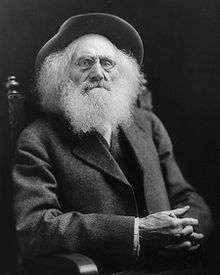Ezra Meeker
| Ezra Meeker | |
|---|---|

Meeker in 1921
|
|
| 1st Mayor of Puyallup, Washington | |
|
In office August 1890 – January 1891 |
|
| Preceded by | new office |
| Succeeded by | James Mason |
|
In office January 1892 – January 1893 |
|
| Preceded by | James Mason |
| Succeeded by | L.W. Hill |
| 1st Postmaster of Puyallup, Washington Territory | |
|
In office 1877–1882 |
|
| Preceded by | new office |
| Succeeded by | Marion Meeker |
| Personal details | |
| Born |
Ezra Manning Meeker December 29, 1830 Butler County, Ohio, United States |
| Died | December 3, 1928 (aged 97) Seattle, Washington, United States |
| Resting place | Woodbine Cemetery, Puyallup, Washington 47°10′14″N 122°18′8″W / 47.17056°N 122.30222°W |
| Citizenship | United States |
| Political party | Republican |
| Spouse(s) | Eliza Jane Sumner (m. 1851–w. 1909) |
| Children | 6 |
| Residence | Meeker Mansion, Puyallup |
| Occupation | Farmer |
| Signature | |
| Nickname(s) | Uncle Ezra, Father Ezra |
Ezra Manning Meeker (December 29, 1830 – December 3, 1928) was an American pioneer who traveled the Oregon Trail by ox-drawn wagon as a young man, migrating from Iowa to the Pacific Coast. Late in life he worked to memorialize the Trail, repeatedly retracing the trip of his youth. Once known as the "Hop King of the World", he was the first mayor of Puyallup, Washington.
Meeker was born in Butler County, Ohio, to Jacob and Phoebe Meeker. His family relocated to Indiana when he was a boy. He married Eliza Jane Sumner in 1851; the following year the couple, with Ezra's brother and with their newborn son, set out for the Oregon Territory, where land could be claimed and settled on. Although they endured hardships on the Trail in the journey of nearly six months, the entire party survived the trek. Meeker and his family briefly stayed near Portland, then journeyed north to live in the Puget Sound region. They settled at what is now Puyallup in 1862, where Meeker grew hops for use in brewing beer. By 1887, his business had made him wealthy, and his wife built a large mansion for the family. In 1891 an infestation of hop aphids destroyed his crops and took much of his fortune. He later tried his hand at a number of ventures, and made four largely unsuccessful trips to the Klondike, taking groceries and hoping to profit from the gold rush.
Meeker became convinced that the Oregon Trail was being forgotten, and he determined to bring it publicity so it could be marked and monuments erected. In 1906–1908, although in his late 70s, he retraced his steps along the Oregon Trail by wagon, seeking to build monuments in communities along the way. His trek reached New York, and in Washington, D.C. he met President Theodore Roosevelt. He traveled the Trail again several times in the final two decades of this life, including by oxcart in 1910–1912 and by airplane in 1924. During another such trip, in 1928, Meeker fell ill but was succored by Henry Ford. On his return to Washington state, Meeker became ill again and died there on December 3, 1928 at age 97. Meeker wrote several books; his work has continued through the activities of such groups as the Oregon-California Trails Association.
...
Wikipedia
